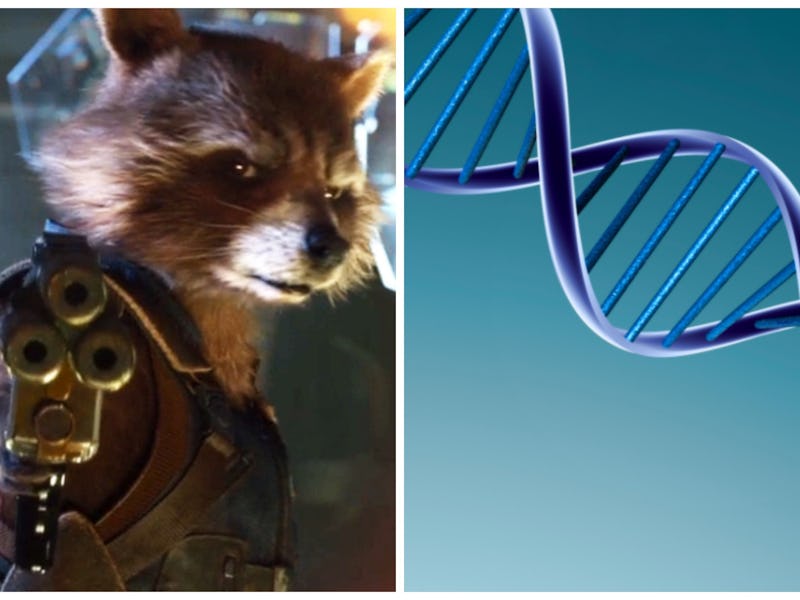'Guardians of the Galaxy 2' Will Be 2017’s Best Movie About Genetic Engineering
Rocket Raccoon isn't as far-fetched as he might seem.

Guardians of the Galaxy Vol.2 will undoubtedly be a contender for best throwback rock movie soundtrack of 2017. A perhaps less-heralded but more important accomplishment: Director James Gunn’s film will likely be this year’s best mainstream mediation on the far-future possibilities of genetic engineering.
Rocket Raccoon is one of the rudest and most hilarious characters in science fiction, but among his cohorts, he’s also the most scientifically realistic. Rocket wasn’t always a member of the Guardians of the Galaxy. His original backstory in Marvel comics established that his home planet was Halfworld, a prison planet which decided to use animals to manage their inmates. Rocket is a actual Raccoon who has become more human thanks to gene-splicing. After getting away from his “job” on Halfword, he briefly hung out with a talking Walrus. In the first film, his one-of-a-kind talking raccoon status gives the character certain amount bitterness: He didn’t ask to be born a genetically-enhanced animal with human characteristics.
In reality, animals can, in fact, be retrofitted with human DNA and then exhibit human behavioral traits because of the genetic manipulation. In 2014, Ann Graybiel and a team at MIT manipulated mice so they would produce the human gene know as Foxp2. This gene is thought to be linked to how “humans have a unique ability to generate and comprehend language.” When the lab mice were enhanced with Foxp2, they learned how to navigate their mazes more quickly than mice who weren’t souped-up with human genetic manipulation. So, in theory, real science exists that means non-human mammals could have their behavior altered by genetic tampering. Professor Gaybiel put it: “The gene that allowed us to speak may have something to do with a special kind of learning.”
Still, the MIT mice didn’t cuss anyone out, or suddenly speak in Bradley Cooper’s voice. But, they were changed by genetic manipulation. Notably, not only is Rocket genetically augmented, he’s also an animal cyborg. Making animals stand upright and talk like a person wouldn’t be possible by genetic manipulation alone, which is why Rocket needs the implants.
It might go without saying that though Rocket is a hero in Guardians of the Galaxy, there is still something patently inhumane about what is done to him — a point they make in the movie when they show his scars. Jonathan Lethem’s first novel, Gun With Occasional Music, depicted something similar: a future Earth in which sentient talking animals are fairly common. But, in Lethem’s view, many of these animals are treated like second class citizens. As in Guardians of the Galaxy, a genetically manipulated talking kangaroo in Gun, with Occasional Music turns to a life of crime — as an assassin no less — mostly because of rampant discrimination.
Bashir, Khan, and Jonathan Lethem's talking Kangaroo.
Science fiction often depicts genetic “augments” simultaneously as villians and victims. The most famous genetically manipulated baddie of all is Khan from Star Trek. In his initial 1966 incarnation, genetic control was limited to the scientific impacts of controlled breeding. But later, Star Trek retrofitted other “augments” to be genetically enhanced as well as having come from a controlled stock of humans, the product of eugenics wars. But Khan, his people, and other genetically enhanced humans on Star Trek aren’t always seen as the bad guys. In Deep Space Nine, it is revealed that Dr. Julian Bashir’s parents had him genetically juiced up when he was young, something which in that future world of the 24th century is strictly illegal.
Like Rocket Raccoon, Julian Bashir didn’t ask for his parents to make that call, though. And that is where mice in the maze wind their way to the most interesting question genetic sci-fi poses: If the mice, Rocket, or Julian never asked to be modified in the first place, should they have been spared? And while a talking Raccoon who fires giant weapons is awesome in Guardians of the Galaxy, the prospect of a real Rocket Raccoon would be likely be very sad, and completely terrifying.